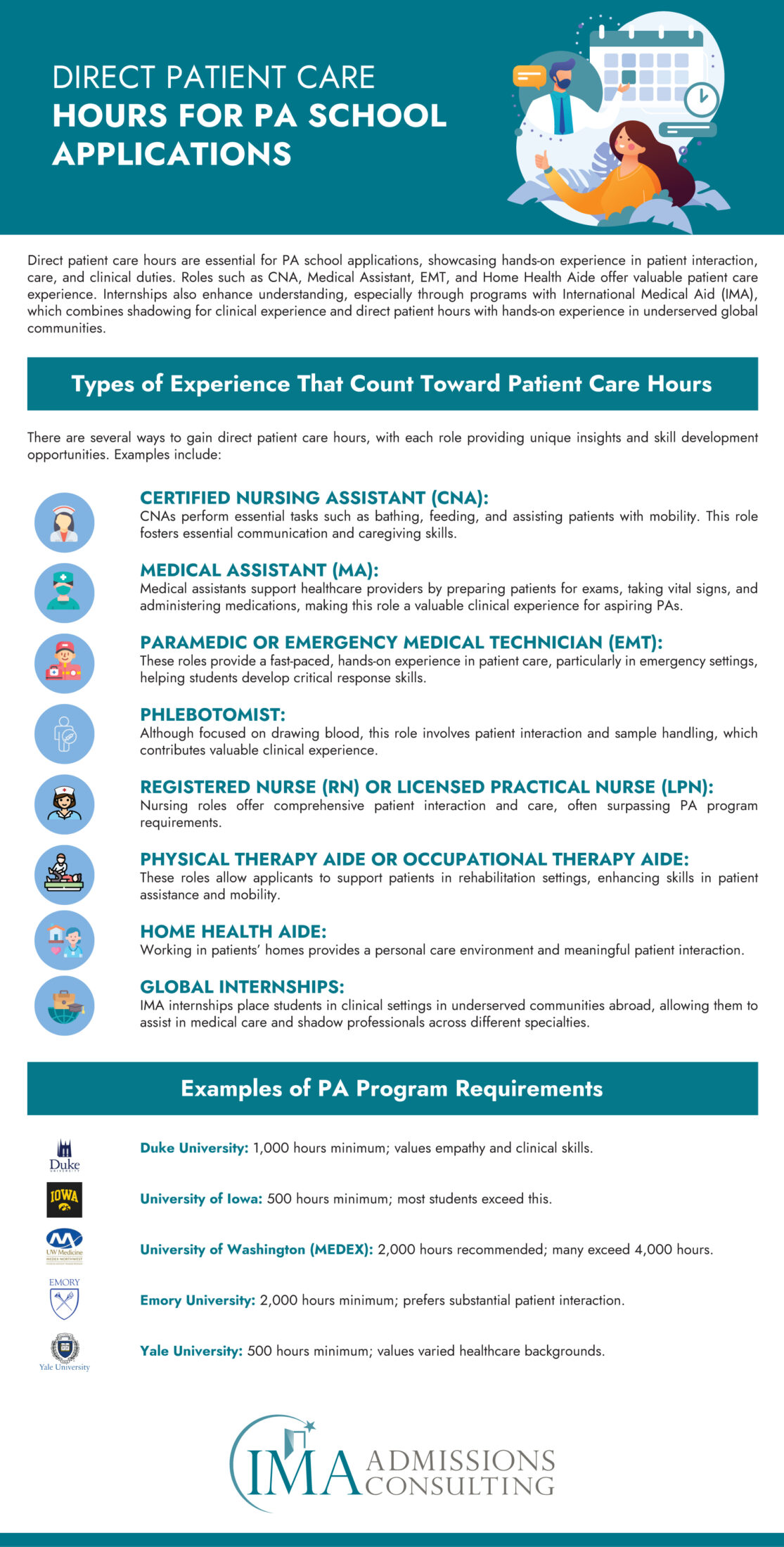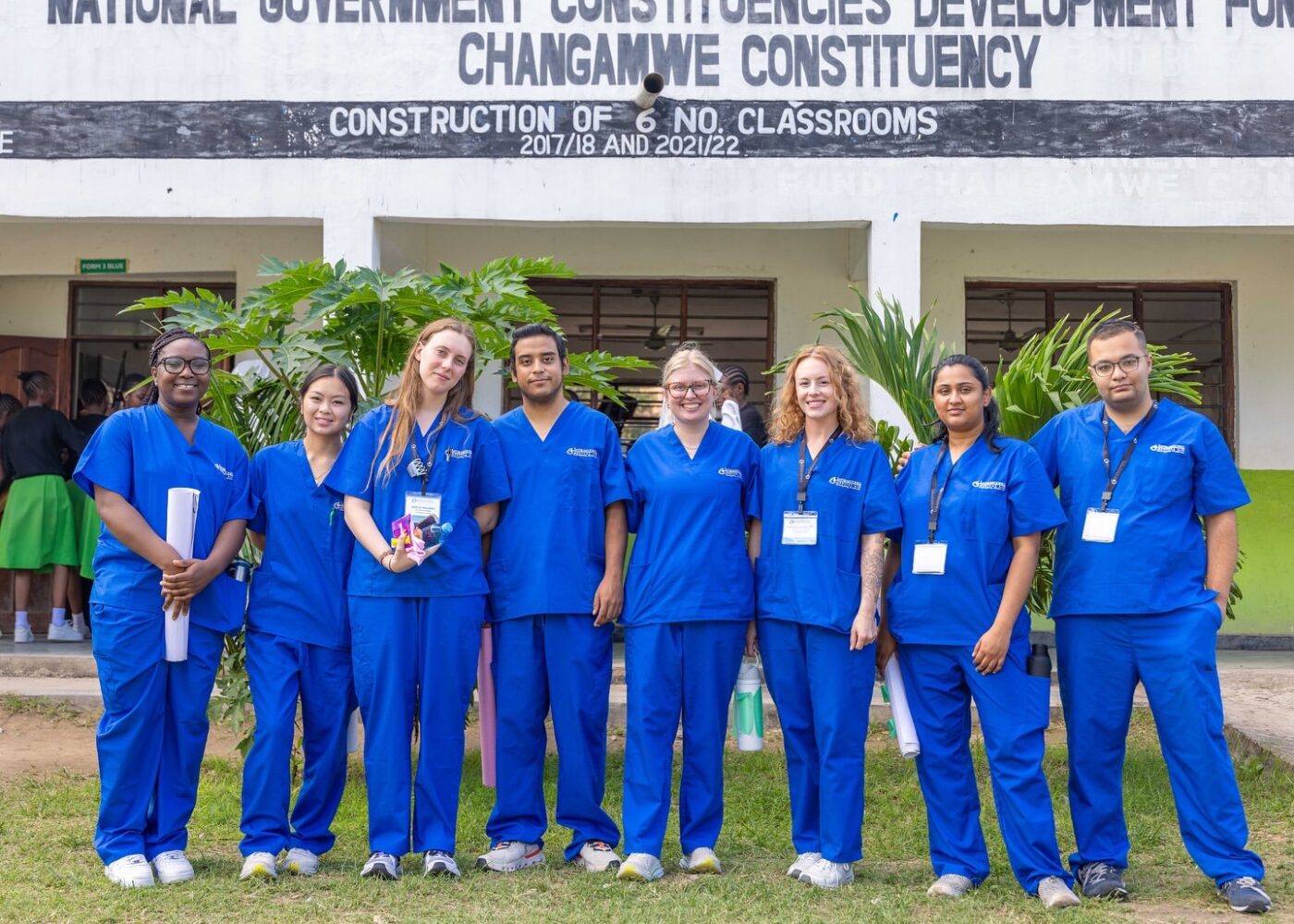When aspiring to become a Physician Assistant (PA), one of the most critical prerequisites is acquiring hands-on patient care experience. Direct patient care hours serve as an indicator of an applicant’s readiness to take on clinical challenges and understand the demands of healthcare environments. The number of required clinical hours varies significantly by program, and applicants are encouraged to review each program’s guidelines carefully to align with their expectations.
While some PA programs do not specify an exact number of hours, the majority expect a substantial commitment to patient care. For competitive applicants, direct patient care hours typically range from 2,500 to 4,000. In some cases, programs might accept a minimum of around 1,000 hours, but exceeding these requirements can enhance the applicant’s standing. This hands-on experience provides insights into patient interactions, medical procedures, and the daily responsibilities of healthcare professionals—an invaluable foundation for a successful PA career.

Types of Experience That Count Toward Patient Care Hours
PA schools emphasize direct patient care roles that involve active and meaningful patient interaction. This differs from shadowing, which, while informative, typically does not count toward these hours in many programs. Direct patient care hours may be earned through roles such as:
Certified Nursing Assistant (CNA) – CNAs are frequently involved in providing basic patient care, such as bathing, feeding, and mobility assistance. This role allows applicants to develop critical skills in patient communication and compassion.
Medical Assistant (MA) – MAs support physicians by preparing patients for examinations, taking vital signs, and administering medications. This role often serves as a great introduction to the clinic environment.
Paramedic or Emergency Medical Technician (EMT) – These roles offer extensive exposure to patient care in urgent settings, giving applicants experience with critical thinking and response.
Phlebotomist – This role involves drawing blood and handling patient samples, and although it might not seem extensive in direct patient care, it still provides valuable clinical experience.
Registered Nurse (RN) or Licensed Practical Nurse (LPN) – Nursing roles can provide comprehensive patient interaction and care, often exceeding the requirements for PA programs.
Physical Therapy Aide or Occupational Therapy Aide – In these positions, applicants work closely with patients to assist in their recovery and mobility, which can be a valuable experience for PA school applications.
Home Health Aide – These aides provide care for patients in their homes, offering a more personal care environment that also counts toward direct patient care.
International Medical Aid (IMA) programs provide unique opportunities to gain both PA direct patient care hours and shadowing experience. IMA internships place students in clinical settings in underserved communities abroad, allowing them to assist in medical care and shadow professionals across different specialties. This international experience enhances cultural competency and gives applicants a broader understanding of healthcare beyond traditional domestic settings.
Each of these roles involves a commitment to learning from hands-on interactions with patients, making it possible to accumulate the patient care hours that PA programs highly value.
Importance of Shadowing for PA School Applicants
Shadowing, though typically not counted as direct patient care hours, is a valuable addition to any PA school application. It allows applicants to observe the daily routines and responsibilities of a Physician Assistant and gain an understanding of how they work alongside doctors, nurses, and other healthcare professionals. Shadowing provides insights into the PA’s role, from patient assessment to diagnosis and treatment planning.
The ideal shadowing experience for a PA applicant is one that is diverse, exposing them to different specialties such as emergency medicine, internal medicine, and pediatrics. This not only demonstrates to PA admissions committees that the applicant is informed about the PA profession but also provides the applicant with a clearer picture of the specialties they may want to pursue.
International Medical Aid Programs: A Path to Gaining Patient Care Hours and Shadowing Experience
Programs like those we offer provide unique opportunities for students eager to accumulate shadowing hours, clinical experience, and direct patienthours. These programs are tailored for pre-health students seeking a mix of volunteer and clinical experience abroad. With programs across Africa and South America, IMA provides structured environments where students can engage in supervised medical care, assist in clinics, and shadow physicians in various specialties.
Programs such as ours not only offer direct patient care but also emphasize cultural competency—a key skill in today’s increasingly diverse healthcare environment. Working in underserved communities exposes students to a broader range of medical conditions and treatment challenges, equipping them with the adaptability needed in PA school and beyond.
Planning Your Clinical Hours - How Much and When to Start
Beginning clinical hours early is advantageous. Many successful PA applicants start acquiring patient care experience during their undergraduate years. This approach enables students to gradually accumulate hours without the pressure of trying to meet the required threshold in a short time frame.
The distribution of hours across roles can also benefit applicants. For instance, some students may start as a CNA, then move into a role as a medical assistant, or even take on responsibilities in a specialty they are interested in, like emergency medicine. Accumulating hours in varied roles not only helps students meet hour requirements but also offers a well-rounded understanding of patient care from multiple perspectives.
Ensuring Hours Meet Program Requirements
The requirements for direct patient care hours can differ widely between PA programs. Some schools are specific about the types of experience they will accept. For instance, one program may accept hours from a phlebotomist position, while another might not consider it as direct patient care. Therefore, consulting the admissions websites or contacting the admissions offices of desired PA programs is essential for ensuring that accumulated hours meet their specific criteria.
Additionally, documenting hours thoroughly is a critical step in applying to PA school. Maintaining a log with the role, number of hours, location, and supervisor contact information can provide necessary validation during the application process.
Examples of Clinical Hours and Shadowing Requirements by PA Programs
Duke University School of Medicine PA Program
Duke University’s PA program requires applicants to complete a minimum of 1,000 hours of direct patient care experience. Known for its prestigious reputation, Duke seeks candidates who bring not only clinical skills but also compassion and empathy to patient interactions. While the minimum requirement is 1,000 hours, competitive applicants often exceed this amount, showing their commitment to healthcare. The program values candidates who demonstrate both technical proficiency and a strong patient-centered approach, which aligns with Duke’s mission of fostering skilled, empathetic healthcare providers.
University of Iowa PA Program
The University of Iowa PA Program has a minimum requirement of 500 hours of direct patient care experience, though most admitted students bring substantially more. Known for its emphasis on hands-on training, Iowa seeks applicants who have demonstrated commitment to healthcare through substantial patient interactions. While the baseline requirement is lower than many other programs, Iowa’s competitive applicants often exceed this, which shows both their readiness for the program’s challenges and a deep commitment to the healthcare field.
University of Washington MEDEX Northwest PA Program
The MEDEX Northwest PA Program at the University of Washington recommends a minimum of 2,000 hours of direct patient care experience, with many accepted students having over 4,000 hours. This program places a strong emphasis on experience and maturity, often preferring applicants with a wealth of hands-on patient interactions across diverse roles. MEDEX values candidates who bring clinical problem-solving abilities and adaptability, aligning with its focus on preparing PAs for a wide range of healthcare settings, particularly in underserved and rural communities.
Emory University PA Program
Emory University’s PA Program requires a minimum of 2,000 hours of direct patient care experience. Emory places a high value on applicants who have gained substantial, hands-on experience in patient care. This program seeks candidates whose clinical roles involved significant patient interaction, as this depth of experience is viewed as essential for mastering the program’s rigorous curriculum. Applicants who bring diverse healthcare experiences are especially attractive, reflecting the program’s commitment to comprehensive patient care training.
Yale School of Medicine PA Program
Yale School of Medicine’s PA Program requires applicants to have at least 500 hours of direct patient care experience. Known for its distinguished reputation, Yale values applicants who bring varied healthcare experiences, as this diversity of background enriches the learning environment. Although 500 hours is the stated minimum, Yale appreciates applicants who go beyond this threshold, demonstrating both a dedication to healthcare and an ability to thrive in a collaborative and intensive academic setting.
University of Southern California (USC) Keck School of Medicine PA Program
The USC Keck School of Medicine PA Program requires at least 1,000 hours of direct patient care experience, with an emphasis on roles that involve active responsibility in patient care. USC looks for candidates who can show a clear understanding of patient care duties and have experience making significant healthcare contributions. With its focus on preparing graduates for a range of healthcare environments, USC values applicants with robust patient care experience that reflects their readiness for both the clinical and interpersonal demands of the PA role.
George Washington University PA Program
George Washington University’s PA Program requires a minimum of 1,000 hours of direct patient care experience, though applicants are encouraged to gain experience in various healthcare settings. GW values a broad spectrum of patient care experiences, recognizing that a diversity of roles can enhance clinical skills and adaptability. This program is particularly interested in candidates who bring not just quantity but also quality of experience, as it aligns with their mission to produce versatile and highly skilled PAs.
University of Colorado PA Program
The University of Colorado PA Program requires a minimum of 1,000 hours of hands-on patient care experience. This program emphasizes the quality and relevance of patient interactions, seeking candidates who have been closely involved in healthcare settings. The University of Colorado values applicants who bring a depth of understanding from direct patient care, as this aligns with its goal to train competent, compassionate healthcare professionals.
Wake Forest School of Medicine PA Program
Wake Forest’s PA Program requires applicants to have a minimum of 1,000 hours of direct patient care experience. The program looks for individuals who show a commitment to healthcare through meaningful patient interactions. Wake Forest values applicants with experience that reflects both compassion and professionalism, preparing them to thrive in a challenging academic and clinical environment. This commitment aligns with the school’s mission of developing skilled and empathetic practitioners.
University of Utah PA Program
The University of Utah PA Program sets a high bar with a minimum requirement of 2,000 hours of direct patient care experience. This program values diverse clinical backgrounds and seeks applicants who have acquired substantial hands-on experience in varied healthcare environments. The University of Utah prioritizes candidates who can demonstrate adaptability and a comprehensive understanding of patient care, traits that are essential for success in their rigorous curriculum.
Boston University PA Program
Boston University’s PA Program requires a minimum of 2,000 hours of direct patient care experience. Known for its rigorous standards, BU looks for applicants whose clinical experience showcases significant patient interaction and a commitment to healthcare. BU values candidates with comprehensive patient care backgrounds, aligning with the program’s mission to train highly skilled healthcare providers ready for a variety of settings.
Northwestern University Feinberg School of Medicine PA Program
The Northwestern Feinberg School of Medicine’s PA Program requires a minimum of 1,000 hours of direct patient care experience, encouraging a variety of patient care roles. This program values applicants who bring diverse clinical experiences, as they enrich the learning environment. Northwestern seeks candidates who demonstrate both technical competency and adaptability in patient care, fostering a collaborative and well-rounded healthcare education.
University of Florida PA Program
The University of Florida PA Program has a minimum requirement of 2,000 hours of direct patient care experience. Florida’s program seeks candidates who have extensive interaction with patients, showing dedication to hands-on clinical care. The program values applicants with comprehensive healthcare experience, as it prepares students for the program’s intensive clinical and academic demands.
University of Texas Southwestern Medical Center PA Program
At the University of Texas Southwestern Medical Center, the PA Program requires a minimum of 1,000 hours of direct patient care experience, with a preference for applicants who have worked in various healthcare roles. UT Southwestern encourages a diversity of clinical experiences, which aligns with the program’s mission of developing versatile healthcare providers prepared for a range of clinical settings.
Arcadia University PA Program
Arcadia University’s PA Program has a relatively low minimum requirement of 200 hours of patient care experience, although additional hours strengthen an applicant’s competitiveness. This program values quality over quantity, looking for candidates whose clinical experiences demonstrate a clear understanding of patient care responsibilities and a commitment to healthcare.
University of Pittsburgh PA Program
The University of Pittsburgh’s PA Program requires a minimum of 500 hours of direct patient care experience. The program seeks applicants who have demonstrated responsibility in patient care settings, showing readiness for its demanding academic and clinical curriculum. Pitt’s program values applicants who exceed this baseline, as a more extensive patient care background enhances both clinical skills and empathy.
Marquette University PA Program
Marquette University’s PA Program requires applicants to complete at least 200 hours of direct patient care experience. This relatively low minimum serves as a starting point, with additional hours strengthening an application. Marquette values applicants who go beyond this requirement, as greater clinical exposure reflects a deeper commitment to the PA profession and readiness for the program.
University of Nebraska Medical Center PA Program
The PA Program at the University of Nebraska Medical Center requires a minimum of 500 hours of direct patient care experience, though it values applicants with a range of healthcare roles. Nebraska seeks candidates who bring varied experiences in clinical settings, as this versatility aligns with its training approach to developing adaptable and skilled healthcare providers.
University of Wisconsin-Madison PA Program
The University of Wisconsin-Madison PA Program requires a minimum of 1,000 hours of direct patient care experience. The program looks for applicants who demonstrate a commitment to healthcare through meaningful patient interactions and hands-on experience. This requirement reflects Wisconsin’s focus on preparing compassionate and competent practitioners equipped to handle diverse healthcare challenges.
University of North Carolina at Chapel Hill PA Program
The University of North Carolina at Chapel Hill PA Program requires at least 1,000 hours of direct patient care experience. UNC particularly values applicants who have served in underserved communities, as this experience reflects both compassion and a commitment to addressing healthcare disparities. This emphasis aligns with UNC’s mission to train healthcare providers who can positively impact diverse patient populations.
Gaining Experience Through Paid and Volunteer Roles
Direct patient care experience can be gained through both paid and volunteer roles. While many students work as CNAs, EMTs, or MAs to gain paid experience, volunteer roles can also be invaluable. Programs such as International Medical Aid offer a way for students to gain volunteer experience abroad while acquiring clinical skills in underserved settings.
For students without access to paid positions, volunteer roles in hospitals, clinics, or community health centers offer ways to gain essential experience. Although volunteer roles may not be as intensive as paid positions, they still provide valuable patient interaction and are generally accepted by PA programs.
Choosing Between Domestic and International Patient Care Experiences
While both domestic and international experiences are valuable, international programs like those offered by IMA expose applicants to different healthcare settings and resource limitations. Working in clinics in developing countries helps students adapt to new medical challenges and gain a deeper appreciation for healthcare disparities. These experiences are particularly valuable in developing cultural competency and empathy—traits that are essential for future PAs.
That said, PA programs often recommend that the majority of hours be obtained domestically, where applicants can familiarize themselves with the healthcare system they will eventually practice in. Combining domestic experience with an international program can be an excellent strategy, allowing students to bring diverse experiences to their applications.
Benefits of Gaining a High Number of Patient Care Hours
Meeting and exceeding the minimum hour requirements can strengthen an application. Here’s why:
Demonstrated Commitment: Completing a high number of hours indicates commitment to the healthcare field and the role of a PA.
Skill Development: More hours mean greater proficiency in patient care skills, which can translate to better performance in PA school clinical rotations.
Stronger Application: Competitive programs receive thousands of applications, and candidates with higher patient care hours stand out.
Insight into the Profession: Spending significant time in patient care settings allows students to fully understand the PA role and become better advocates for their future patients.
Documenting and Reflecting on Patient Care Hours
Documenting patient care hours accurately is just as important as gaining them. Many PA programs expect a detailed account of each role undertaken, including responsibilities, supervisors, and start/end dates. PA programs appreciate applicants who can not only list their experiences but also reflect on how these experiences have shaped their perspectives and prepared them for a career as a PA.
It’s beneficial to keep a journal or log of experiences, noting down interesting cases, challenges, and moments of learning. This reflective practice can be useful in interviews and application essays, where applicants are often asked to discuss their motivations for becoming a PA.
If you’re looking to gain patient care hours for PA school without a certification, there are still plenty of ways to build relevant experience. Roles such as medical scribe, caregiver, or physical therapy aide often don’t require certification but provide valuable patient interaction and insight into healthcare environments. These positions allow aspiring PAs to gain essential hands-on experience needed for program requirements.
For a comprehensive guide on how to get patient care hours without certification, read our article on patient care hours for PA school without certification.
Preparing for PA school involves meeting specific requirements, prerequisites, and developing a strong application strategy. From course prerequisites to patient care hours and shadowing, each part of the process helps build a competitive profile.
For a comprehensive overview of what PA schools require, see our Definitive Guide to PA School Requirements and Prerequisites.
Curious about common questions PA admissions teams ask? Our resource on the Most Common PA School Admissions Questions offers insights to help you prepare effectively.
If you’re ready to apply, learn more about How to Get into PA School with practical tips for each stage of your journey.
Balancing Patient Care Hours with Academic and Personal Commitments
Gaining patient care hours while balancing school, work, or other responsibilities can be challenging. However, setting a schedule that includes consistent weekly or monthly patient care experience is manageable for most students. Even a few hours each week can add up over time, making it possible to reach the desired total within a few years.
Final Thoughts on Direct Patient Care Hours for PA School
Securing direct patient care hours is a cornerstone of the PA school application process. While each PA program has unique requirements, exceeding the minimum hours, gaining experience in various healthcare roles, and even participating in international programs can collectively strengthen an application. Shadowing and clinical volunteer programs like those offered by International Medical Aid can also add to an applicant’s skill set and understanding of the profession.
For those aiming to join a PA program, dedication to accumulating these hours, thoughtful reflection on the experiences, and demonstration of a commitment to patient-centered care will help them stand out to admissions committees.





